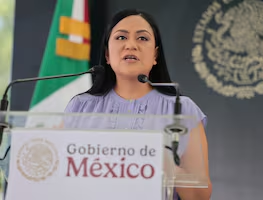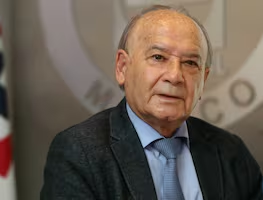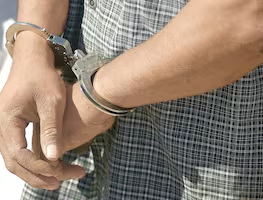Más Información

Ariadna Montiel pide colaboración a gobernadores y presidentes municipales; buscan priorizar pueblos indígenas

Sheinbaum llama a gobernadores y alcaldes a invertir en agua y caminos; pide seguir con estrategia de seguridad

Desarme voluntario en la Basílica ya tiene resultados, afirma Rosa Icela; continúa concientización sobre las armas

Cae “Billy” Álvarez, exdirector de la Cooperativa Cruz Azul por delincuencia organizada en la CDMX; era buscado desde hace 5 años
As president of Mexico , Andrés Manuel López Obrador will have to deal with the most serious political powder keg in terms of social economy and institutions: Central America in the 21st century .
López Obrador will have a crucial precedent, since Mexico was directly involved in the isthmus crisis during the wars of Guatemala (1960-1996), El Salvador (1980-1992), and Nicaragua (1977-1979 & 1981-1990) , amidst a struggle between consumerism and anti-consumerism sparked by the United States.
Facing the former U.S. president Ronald Reagan (1981-1988) , who preferred an armed approach to a peaceful one in solving political difficulties in Central America, Mexico joined Venezuela, Panama, and Colombia in 1983 to create the Contadora Group , which conflicted with Washington by supporting Nicaragua, Costa Rica, El Salvador, Guatemala, and Honduras , leading to a peace accord signed in 1987 .
The agreement led to a cease-fire without settling the socioeconomic tolls of the conflict. As a consequence, Mexico’s neighbors in the south are still undergoing explosive conditions: Global agencies have warned that more than half of the 6.6 million Central Americans live in the most extreme poverty, 6.2 million are malnourished, and the concentration of wealth in a privileged minority has aggravated inequality .
Guatemala, El Salvador, Honduras, and Nicaragua
, who have claimed that they lack resources to address their social issues, spent 24.37 billion dollars on military expenses from 1988 to 2017 , according to the Stockholm International Peace Research Institute . However, Costa Rica and Panama have no army.
Guatemala, El Salvador, and Honduras are some of the most violent nations in the world , registering a total of 77,746 murders from 2013 to 2017 , according to official records. This social and political panorama is aggravated by systematic human rights violations, impunity, lawlessness, and corruption in all spheres .
Born in the United States 40 years ago, criminal groups such as the Mara Salvatrucha and 18 have consolidated their power in the Central American territory , conducting contract killings, extortion, drug dealing, and other activities. Other criminal organizations dedicated to human and arms trafficking, money laundering, and smuggling of wood, archaeological items, and other goods have also settled in the region.
This has lead to a migratory disaster of growing proportions. On the one hand, thousands of Guatemalans, Hondurans, and Salvadorans are fleeing regional insecurity , traveling as irregular migrants through Mexico and into the United States.
On the other hand, thousands of Nicaraguans have traveled to Costa Rica and Honduras , fleeing from the political repression that started last April shortly after president Daniel Ortega was elected . The Nicaraguan people claimed that the election had been rigged and thus demanded democracy and political freedom. The conflict has left a toll of between 198 and 550 dead .
A third factor are the hundreds of Africans and Asians who have undertaken an inland and ocean journey from South to North America , joining the numerous Central Americans who are fleeing to the United States through Mexico.
There is another factor adding pressure to this complex social situation: A political class that loses credibility by the minute .
There are currently four ex-presidents behind bars on charges of corruption: Guatemalans Álvaro Colom and Otto Pérez; Salvadoran Antonio Saca, and Panamanian Ricardo Martinelli . Another former president –the Salvadoran Mauricio Funes - has requested political asylum in Nicaragua after fleeing from corruption charges in his country of origin.
Without taking into account the political violence of Nicaragua, Honduras has suffered instability ever since the current president, Juan Orlando Hernández, re-elected himself ; an unprecedented event considering that re-election has been constitutionally forbidden in the country since 1981 . The political opposition claimed that the election had been rigged and post-election protests have left a toll of around 50 dead.
After Mexico’s federal elections , which led to the landslide victory of President Andrés Manuel López Obrador , an idea has emerged to implement a “Marshall Plan” similar to the one that helped rebuild Europe after World War II (1939-1945), only this time in Central America.
The goal is to tackle the root causes of migration –violence, poverty, and social exclusion- with funding from Mexico, the United States, Canada, and the international community, though this would represent an investment of around 30 billion dollars.
Notwithstanding, several plans with fancy names and last names have been applied since the end of the 20th century –such as the Kissinger, Sanford, Tuxtla Gutiérrez, Puebla-Panamá, and Alliance for Progress plans - to aid Honduras, Nicaragua, Guatemala, and El Salvador. Some of them failed, and others were never implemented due to corruption and lawlessness in the region.
dm
Noticias según tus intereses

Confiesan pago por preguntas en la Mañanera | El Universal

El día que casi atrapan al Mayo | El Universal

Se lanzan contra Majo Aguilar por su manera de bailar en el escenario: "no es calentamiento de futbol"

Laura Flores y Lalo Salazar confirman su noviazgo: "dispuestos a caminar juntos", dice el conductor

Mujeres Bienestar: Ya puedes registrarte para solicitar esta pensión; conoce aquí a los requisitos








